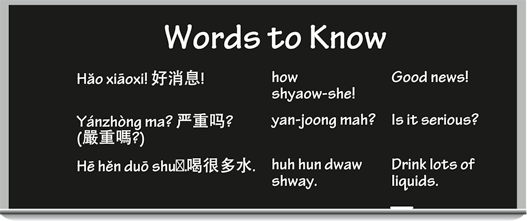Chinese For Dummies (132 page)
Read Chinese For Dummies Online
Authors: Wendy Abraham

Making a diagnosis
Did your doctor say those magic words:
Méi shénme
没ä»ä¹
(
æ²ç麼
)
(may shummuh)
(
It's nothing
)? Yeah, neither did mine. Too bad. I bet you've heard stories about how doctors who use traditional medical techniques from ancient cultures can just take one look at a person and immediately know what ails them. The truth is, aside from simple colds and the flu, most doctors still need to take all kinds of tests to give a proper diagnosis. They may even need to perform the following tasks:
 huà yà n
huà yà n
åéª
(
åé©
) (hwah yan) (
lab tests
)
 xīndià ntú
xīndià ntú
å¿çµå¾
(
å¿é»å
)
(shin-dyan-too) (
electrocardiogram
)
 huà yà n yÃxià xiÇobià n
huà yà n yÃxià xiÇobià n
åéªä¸ä¸å°ä¾¿
(
åé©ä¸ä¸å°ä¾¿
) (hwah-yan ee-shyah shyaow-byan) (
have your urine tested
)
When the doctor is ready to give you the verdict, here are some of the conditions you may hear (the minor ones, at least; check out
Table 19-3
for more serious diagnoses):
 bìngdú
bìngdú
ç
æ¯
(beeng-doo) (
virus
)
 gÇnmà o
gÇnmà o
æå
(gahn-maow) (
a cold
)
 gÇnrÇn
gÇnrÇn
ææ
(gahn-rahn) (
infection
)
 guòmÃn
guòmÃn
è¿æ
(
éæ
) (gwaw-meen) (
allergies
)
 liúgÇn
liúgÇn
æµæ
(lyo-gahn) (
flu
)
 qìguÇnyán
qìguÇnyán
æ°ç®¡ç
(
氣管ç
) (chee-gwahn-yan) (
bronchitis
)
Talkin' the Talk
Pete takes his daughter, Lauren, to the
yÄ«shÄng
(
doctor
) after he notices her bad cough. The doctor takes her temperature and discusses what she may have with the family.
YÄ«shÄng:
Lauren, hÇo xiÄoxi! NÇde tÇwÄn zhèngcháng.
Lauren, how shyaow-she! nee-duh tee-one juhng-chahng.
Lauren, good news! Your temperature is normal.
Lauren:
HÇo jà le.
how jee luh.
Great.
YÄ«shÄng:
KÄnéng zhÇ shì gÇnmà o.
kuh-nung jir shir gahn-maow.
Perhaps it's just a little cold.
Pete:
Hái chuánrÇn ma?
hi chwahn-rahn mah?
Is it still contagious?
YÄ«shÄng:
Bú huì.
boo hway.
No.
Lauren:
Yánzhòng ma?
yan-joong mah?
Is it serious?
YÄ«shÄng:
Bù yánzhòng. NÇ zuì hÇo xiÅ«xi jÇ tiÄn hÄ hÄn duÅ shuÇ, jiù hÇo le.
boo yan-joong. nee dzway how shyow-she jee tyan huh hun dwaw shway, jyo how luh.
No. You should rest for a few days and drink lots of liquids, and it should get better.
Pete:
TÄ dÄi zà i chuángshà ng tÇng duÅjiû?
tah day dzye chwahng-shahng tahng dwaw-jyo?
How long must she rest in bed?
YÄ«shÄng:
Zuì hÇo liÇng sÄn tiÄn.
dzway how lyahng sahn tyan.
Ideally for two or three days.

 In Chinese, you generally put a negative prefix, such as
In Chinese, you generally put a negative prefix, such as
bù
ä¸
(boo), in front of the verb you're negating. It sounds redundant in English to literally translate a response as
not serious
when someone asks about the seriousness of a situation. It's more colloquial and appropriate to translate it as
no,
as you see in the previous Talkin' the Talk section when Lauren asks the doctor if her ailment is serious.